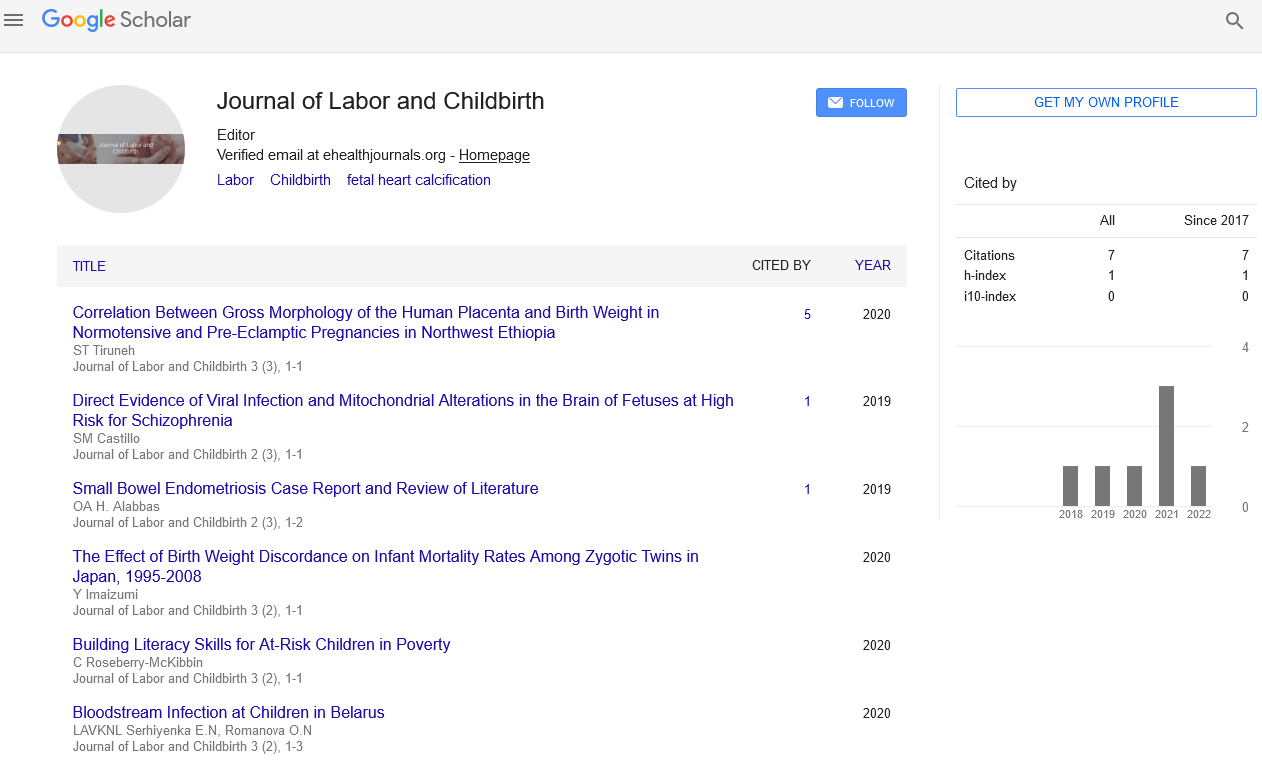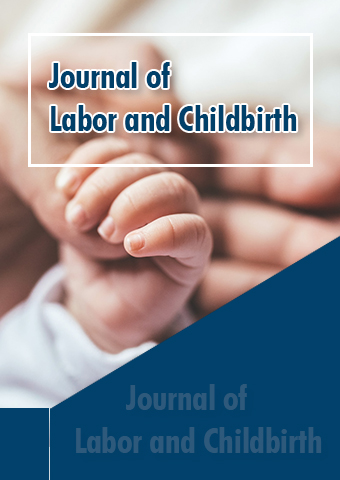Perspective - Journal of Labor and Childbirth (2023) Volume 6, Issue 5
Reasons behind Miscarriages during Pregnancy
- Corresponding Author:
- Gavin Hilson
Department of Child Welfare,
Suraj University,
Derby,
United Kingdom
E-mail: g.m.hilson@surey.ac.uk
Received: 04-Sep-2023, Manuscript No. jlcb-23-118888; Editor assigned: 07-Sep-2023, PreQC No. jlcb-23-118888 (PQ); Reviewed: 21- Sep-2023, QC No. jlcb-23-118888; Revised: 03-Oct-2023, Manuscript No. jlcb-23-118888 (R); Published: 31-Oct-2023, DOI: 10.37532/ jlcb.2023.6(5).147-148
Introduction
Pregnancy is a miraculous and transformative journey that marks the beginning of new life. This incredible process typically spans around nine months, during which a fertilized egg develops into a fully-formed baby within a mother’s womb. As the weeks pass, the embryo evolves into a fetus and mothers experience profound physical and emotional changes. These changes are accompanied by prenatal care, ultrasounds and the joy of feeling the baby’s first kicks. While pregnancy can present its share of challenges, it is a time filled with anticipation, wonder and the promise of a new family member. It is a journey that showcases the resilience, strength and beauty of the human body.
Pregnancy is a time of anticipation, joy and hope for many, but it can also be marked by uncertainty and anxiety, particularly when miscarriages occur. Miscarriages are emotionally distressing events that affect countless couples around the world. While they can be heartbreaking, it is essential to explore the reasons behind miscarriages to promote awareness and potentially reduce the risk. In this article, we will delve into the various factors contributing to miscarriages during pregnancy, shedding light on this common yet often misunderstood phenomenon.
Description
Infertility is a widespread issue, affecting approximately 15% of couples worldwide. While it often leads to feelings of frustration, despair and stress, it’s essential to remember that infertility is a medical condition and help is available. To begin, let’s explore some fundamental aspects of infertility.
Genetic factors
Chromosomal abnormalities: One of the most common reasons for miscarriage is chromosomal abnormalities in the developing fetus. These abnormalities occur due to errors during the formation of the embryo’s chromosomes, leading to an unviable pregnancy. Chromosomal issues are often a random occurrence and not something within a couple’s control.
Advanced maternal age: Women over the age of 35 have an increased risk of miscarriage due to a higher likelihood of chromosomal abnormalities in their eggs. As women age, the quality of their eggs decreases, making miscarriages more common in older mothers.
Hormonal imbalances
Polycystic Ovary Syndrome (PCOS): Women with PCOS may experience hormonal imbalances that affect the menstrual cycle and ovulation, increasing the risk of miscarriage. PCOS is characterized by irregular periods, insulin resistance and high levels of androgens.
Thyroid disorders: Both hyperthyroidism and hypothyroidism can impact the hormonal balance necessary for a healthy pregnancy. Uncontrolled thyroid conditions may contribute to miscarriages.
Anatomical factors
Uterine abnormalities: Variations in the shape or structure of the uterus, such as fibroids, septate uterus or bicornuate uterus, can hinder implantation and the growth of the fetus, resulting in miscarriages.
Cervical incompetence: In some cases, a weak cervix may open prematurely during pregnancy, causing a miscarriage. This condition can often be managed through medical procedures.
Lifestyle and environmental factors
Smoking and substance abuse: Smoking, recreational drug use and excessive alcohol consumption during pregnancy are well-documented risk factors for miscarriage. These substances can disrupt fetal development and increase the likelihood of complications.
Medications: Certain medications, when taken during pregnancy, can pose a risk to the developing fetus. It’s crucial to consult with a healthcare provider to assess the safety of any medications during pregnancy.
Environmental toxins: Exposure to environmental toxins, such as lead, radiation and certain chemicals, can increase the risk of miscarriage. Pregnant women should take precautions to minimize exposure to harmful substances.
Infections
Bacterial and viral infections: Infections like listeria, toxoplasmosis and rubella can have devastating consequences for a developing fetus and may result in miscarriage. It is vital to maintain proper hygiene and seek medical attention if an infection is suspected.
Immune system factors
Autoimmune disorders: Autoimmune diseases like lupus, antiphospholipid syndrome and rheumatoid arthritis can lead to miscarriages. These conditions can cause the immune system to attack the developing fetus.
Immunological incompatibility: Some couples may have immunological incompatibility between the mother and the fetus, leading to the rejection of the embryo. This condition can often be diagnosed and managed by specialists.
Blood clotting disorders
Antiphospholipid syndrome: This disorder can lead to the formation of blood clots in the placenta, reducing blood flow to the developing fetus and resulting in miscarriage. Bloodthinning medications and close monitoring are typically recommended for women with this condition.
Inadequate prenatal care
Lack of proper healthcare: Inadequate prenatal care, including missed appointments and the absence of proper monitoring, can contribute to miscarriages. Regular check-ups are essential to detect and address potential issues early.
Multiple pregnancies
Twin and higher-order pregnancies: While multiples can be a source of joy, they are associated with a higher risk of miscarriage. The increased demands on the mother’s body and the heightened risk of complications can result in miscarriages.
Stress and psychological factors
Emotional stress: High levels of stress and anxiety can lead to hormonal imbalances and potentially contribute to miscarriages. Reducing stress through relaxation techniques and counseling may help mitigate this risk.
Conclusion
Miscarriages are complex and emotionally challenging experiences that affect many couples during pregnancy. While the reasons behind miscarriages are diverse and multifaceted, understanding these factors can be a crucial step in reducing their occurrence and providing support to those affected.
It is important to remember that many miscarriages occur due to factors beyond an individual’s control, such as chromosomal abnormalities. Advances in medical science and prenatal care have provided hope for couples facing these challenges, offering a chance for healthier pregnancies in the future.
Moreover, emotional support, both from loved ones and professionals, is invaluable for those who have experienced a miscarriage. Open discussions about miscarriages and the factors contributing to them can help reduce stigma, enhance awareness and create a more empathetic and informed society. In the end, the journey through pregnancy, with its joys and sorrows, underscores the need for compassion and understanding as we strive to support those who have experienced miscarriages on their path to parenthood.

